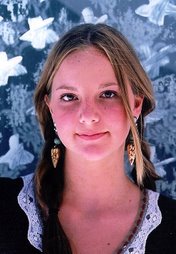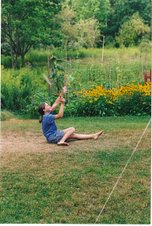
It is a quiet Sunday night in Narrowsburg, NY. This morning Richard and I saw a scarlet tanager flying from branch to branch eating insects I guess. All of the birds here seem to dine on insects for their main diet. We have flycatchers, cedar waxwings, phoebes, kingbirds, catbirds. There is also a ferocious mother hen wild turkey who doesn't fly or eat insects as far as I can tell; I have yet to see her chicks.
Elizabeth loved the peacefulness of this part of the state, and we miss her when we come here, but we remember how we used to sit together on the big front porch and read or paint, or watch the hummingbirds bomb each other on their way to the feeder.
















